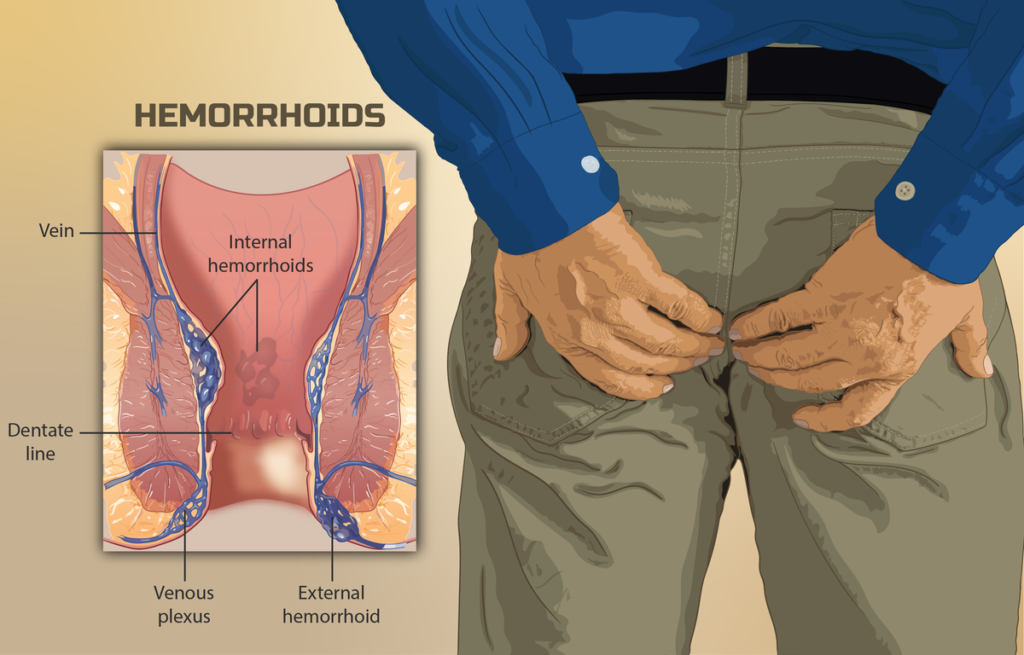
Hemorrhoids are a common medical condition that can cause significant discomfort and inconvenience. While they are not usually serious, the physical discomfort and pain associated with hemorrhoids can take a serious toll on a person’s emotional wellbeing. Although many people may feel embarrassed or ashamed to discuss their hemorrhoids, it is important to address the emotional impacts of this condition. Dealing with hemorrhoids can lead to anxiety, depression, and low self-esteem, which can exacerbate the symptoms and make it difficult to cope with day-to-day activities.
Fortunately, there are strategies and coping mechanisms that can help individuals manage the emotional impacts of hemorrhoids. This blog post will explore the psychological effects of hemorrhoids, and provide practical tips and techniques to help individuals take control of their emotional wellbeing during this challenging time. We will discuss the importance of self-care, including techniques for managing discomfort, stress, and anxiety. We will also explore how to navigate social situations when dealing with hemorrhoids, and strategies for talking to family
1. Acknowledge and process your emotions

Coping with the emotional impacts of hemorrhoids can be challenging as it involves dealing with physical and emotional discomfort. It is important to acknowledge and process your emotions in order to manage the associated stress and anxiety. The symptoms of hemorrhoids, including external or internal hemorrhoids, bleeding hemorrhoids, and what hemorrhoids look like, can cause embarrassment, anxiety, and frustration. Acknowledging and understanding these emotions can help you to identify your triggers, cope with the physical discomfort, and develop a positive mindset. Strategies to process your emotions may include journaling, speaking with a healthcare professional, joining a support group or online community, or practicing meditation and mindfulness techniques. Remember, seeking support and taking an active role in managing your emotions is a vital step in coping with the emotional impacts of hemorrhoids.
2. Take steps to reduce stress
In addition to seeking medical treatment for the physical symptoms of external hemorrhoids, internal hemorrhoids, bleeding hemorrhoids, and other related issues, it’s important to address the emotional impacts as well. One step that can be taken to cope with the emotional effects of hemorrhoids is to reduce stress. Stress can exacerbate the symptoms of hemorrhoids, prolong the healing process, and impact your overall well-being. To reduce stress, it may be helpful to identify and avoid triggers, practice relaxation techniques such as deep breathing or meditation, exercise regularly, and make time for enjoyable activities. It’s important to prioritize self-care and seek support from loved ones during this difficult time. By taking steps to reduce stress, you can better manage the emotional impacts of what do hemorrhoids look like and other hemorrhoids symptoms, promoting overall healing and well-being.
3. Make time to relax

As individuals coping with the emotional impacts of hemorrhoids, it is essential to prioritize relaxation in our daily routine. Hemorrhoids are swollen or inflamed veins in the anal or rectal area, which can cause discomfort, itching, and pain. These symptoms can lead to anxiety, stress, and frustration, negatively impacting our emotional state and overall well-being. By making time to relax, we can ease our minds and reduce the emotional toll of hemorrhoids. Relaxation techniques such as deep breathing, meditation, and yoga can help reduce stress and anxiety levels. Additionally, external hemorrhoids and bleeding hemorrhoids symptoms can worsen with physical activity, making it pivotal to rest and take breaks to avoid exacerbating the condition. Prioritizing relaxation will not only help manage the emotional effects of hemorrhoids, but it can also potentially improve the physical recovery process.
4. Connect with supportive family and friends
Managing the emotional impacts of hemorrhoids can be challenging, but having a strong support system can make all the difference. It’s important to connect with supportive family and friends to share your experiences and seek encouragement when dealing with external hemorrhoids, internal hemorrhoids, bleeding hemorrhoids, what do hemorrhoids look like, and other hemorrhoids symptoms. It’s common to feel embarrassed or uncomfortable talking about hemorrhoids, but opening up to trusted loved ones can provide much-needed emotional relief and support. Remember, hemorrhoids are a common condition, and your loved ones may be more understanding and helpful than you think. Talking to a healthcare provider or a mental health professional can also be helpful in coping with the emotional impacts of hemorrhoids.
5. Seek professional help if needed
If you are dealing with external hemorrhoids, internal hemorrhoids, bleeding hemorrhoids, what do hemorrhoids look like, or hemorrhoids symptoms, it is important to know that seeking help from a healthcare professional is always an option. While some instances of hemorrhoids may clear up on their own or with the use of over-the-counter remedies, others may require more intensive treatments or procedures. In severe cases, surgery may be necessary to manage the condition. It is important to discuss your symptoms with a healthcare provider to determine the best course of action for your specific situation. Don’t hesitate to seek help if you are struggling to cope with the emotional impacts of hemorrhoids. Your healthcare provider can provide reassurance and advice, as well as recommend appropriate treatments or refer you to a specialist if necessary. Remember, seeking professional help is a crucial step in managing hemorrhoids and improving your overall well-being.
6. Avoid unhealthy coping mechanisms
Coping with the emotional distress of hemorrhoids can be challenging for many people, especially if they experience external hemorrhoids, internal hemorrhoids, bleeding hemorrhoids, or other unpleasant hemorrhoids symptoms. While seeking medical treatment is essential for managing these symptoms, it’s also crucial to address the emotional impacts of hemorrhoids. One way to do this is to avoid unhealthy coping mechanisms, such as excessive alcohol consumption or engaging in risky behaviors that may exacerbate the condition. These behaviors can negatively impact a person’s mental and emotional well-being, making it more difficult to manage the physical symptoms of hemorrhoids. It’s recommended to seek guidance from a healthcare professional about healthy coping mechanisms and strategies to help reduce the emotional burden of dealing with hemorrhoids.
7. Participate in activities you enjoy
Engaging in enjoyable and stress-reducing activities can play a crucial role in coping with the emotional impacts of hemorrhoids, whether external hemorrhoids, internal hemorrhoids, bleeding hemorrhoids, or those that cause discomfort or pain. By participating in activities that bring joy and relaxation, such as spending time with friends and family, reading a book, listening to music, or pursuing hobbies, you can reduce the negative impact of hemorrhoids symptoms on your emotional well-being. It is important to find activities that don’t put too much strain on the affected area and to discuss any concerns with your healthcare provider. Focusing on the things you enjoy and that bring you happiness can help you manage the stress and anxiety that can accompany hemorrhoids, ultimately supporting a more positive outlook on your health and overall quality of life.
8. Utilize distraction techniques to refocus your thoughts
When dealing with the emotional impacts of hemorrhoids, it can be helpful to utilize distraction techniques to refocus your thoughts. This may include engaging in activities that are enjoyable and mentally stimulating, such as reading a book, listening to music, or practicing relaxation techniques like deep breathing or meditation. It’s important to keep in mind that external hemorrhoids, internal hemorrhoids, bleeding hemorrhoids, what do hemorrhoids look like, and hemorrhoid symptoms can all be stressful and overwhelming to deal with, but taking intentional steps to refocus your thoughts can help to alleviate some of the emotional distress they may cause. Remember to be patient with yourself and seek support from loved ones or healthcare professionals if needed.
In concluding, hemorrhoids can be an uncomfortable experience, both physically and emotionally. It’s essential to care for your health by seeking medical attention, practicing healthy habits, and maintaining an optimistic attitude. Exploring natural remedies or finding support through friends, family, or a health professional can also ease the emotional burden of this condition. Keep in mind that coping with hemorrhoids is a process that takes time and patience, and it’s worth putting in the effort to improve your quality of life. Remember that you’re not alone in this, and with the right mindset and support, you can overcome the emotional impacts of hemorrhoids.




